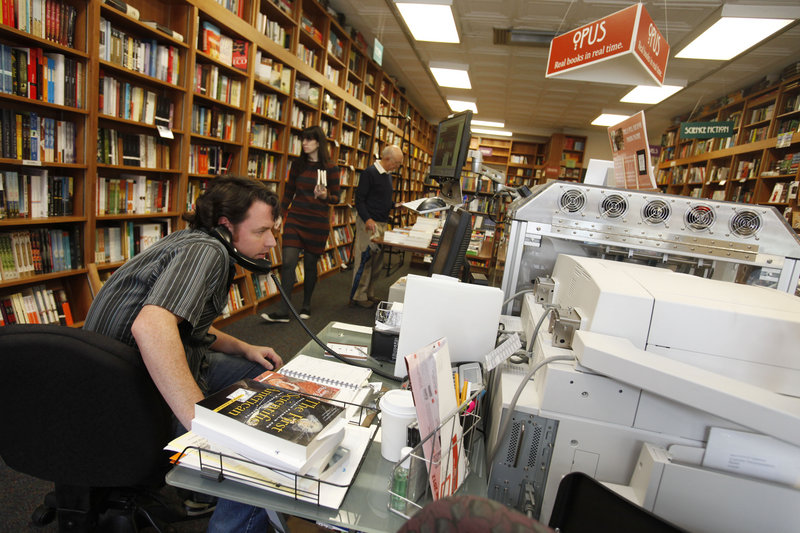WASHINGTON – Clare Dickens only wanted to share her story to help others. But in the process, she became a successful independent author — with the help of a local bookstore and its instant publishing machine.
Dickens wrote “A Dangerous Gift” with her son Titus, a memoir of their life dealing with his bipolar disorder. She completed the novel after he took his own life at the age of 25 in 2006.
Though Dickens found a publisher in Iceland to release the book in 2007, she still wanted a broader reach. The Espresso Book Machine at Politics and Prose in the District of Columbia allowed her to bring the memoir to local bookshelves and beyond earlier this year.
Her book has since become the bookstore’s best-selling self-published title.
“I didn’t expect to sell any at all,” Dickens said. “I didn’t want to be a best-seller. It’s really about getting my son’s story out there and helping other people.”
Self-publishing has been made easier since the Espresso Book Machine by On Demand Books debuted in 2006. The machine also can make copies of out-of-print editions.
The first machine was installed briefly at the World Bank’s bookstore. Through a partnership with Xerox, the company now has machines in about 70 bookstores and libraries across the world, including London; Tokyo; Amsterdam; Abu Dhabi, United Arab Emirates; Melbourne, Australia; and Alexandria, Egypt.
Thor Sigvaldason, chief technology officer of New York-based On Demand Books, said the technology offers twofold help to book retailers.
“It can, potentially, give them a huge virtual inventory, so they can have as many books as Amazon, all in a little bookstore,” he said. “It turns independent bookstores into places to get books published. It’s a new thing for the bookstore to do: not just sell books, but actually create books.”
Dickens’ book costs $10.38 to print and retails for $16. Bill Leggett, a bookseller who co-manages the machine, said about a dozen copies are sold a month. “That’s better than a lot of authors who have major publishers,” he said.
Politics and Prose has produced almost 5,000 paperback books — some in as little as five minutes — since receiving the book machine nicknamed “Opus” last November. Leggett said about 90 percent of the books printed on the machine are self-published.
The others are out-of-print editions, millions of titles available in the public domain and digital formats licensed out through major publishers.
Customers at Politics and Prose have also printed rare editions, or “editions drifted out of print,” by Henry David Thoreau, Ralph Waldo Emerson and William Shakespeare, Leggett said. An out-of-print edition of Mark Twain’s “The Tragedy of Pudd’nhead Wilson” with a simple cover and more than 400 pages costs about $12.
Interest in producing paper books comes at a time of substantial growth in the electronic book industry. The Association of American Publishers reported 3.4 million ebooks were sold last year, up more than 300 percent from 2010. Still, revenue from electronic book sales was just a fraction of that for printed books, $21.5 million compared to $335.9 million, the association said.
As bookstores continue to close their doors, crippled by ebooks and digital reading devices, more are embracing the Espresso Book Machine.
Northshire Bookstore in Manchester Center, Vt., produces about 5,500 books per year on the Espresso Book Machine. Debbi Wraga, the book machine coordinator, said it’s mostly used for selfpublishing, about 350 titles so far. Other customers use it to produce rare books including foreign titles, or personalize books, such as Christmas carols with family photos.
“Besides the novelty of it, to have customers come and strike up a conversation, it’s a way for us to really engage our public and find a creative way to still sell the books,” Wraga said. “It’s a wonderful feeling when you take it off the press and hand it to the author. You can smell the glue and the book is still warm. It’s almost like handing a newborn baby to a mom.”
Wraga said the book machine accounted for nearly 4 percent of the bookstore’s 2011 revenue.
Leggett, of Politics and Prose in Washington, D.C., said consumers now have control over the publishing process, from deciding the physical dimensions, cover and layout, to how much they want to pay for it.
Send questions/comments to the editors.



Success. Please wait for the page to reload. If the page does not reload within 5 seconds, please refresh the page.
Enter your email and password to access comments.
Hi, to comment on stories you must . This profile is in addition to your subscription and website login.
Already have a commenting profile? .
Invalid username/password.
Please check your email to confirm and complete your registration.
Only subscribers are eligible to post comments. Please subscribe or login first for digital access. Here’s why.
Use the form below to reset your password. When you've submitted your account email, we will send an email with a reset code.